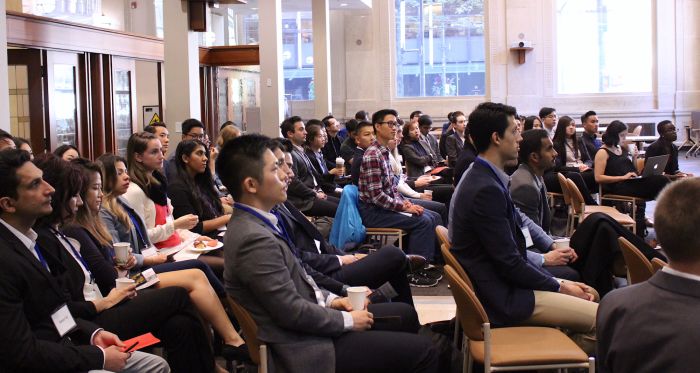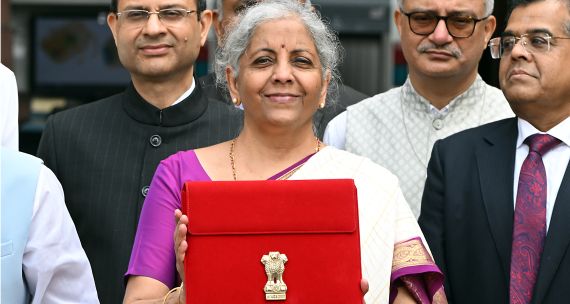According to the Asia Pacific Foundation of Canada’s (APF Canada) national opinion poll, 59 per cent of Canadians believe that within the not-too-distant future, our trade with Asia will outweigh our trade with the United States. More than half – 53 per cent – are concerned that Canada will fall behind international competitors in gaining access to Asian markets. To try to close this competitiveness gap, APF Canada is committed to strengthening Canadians’ Asia competence – the type of knowledge, skills, and experiences that help one succeed when engaging partners in or from Asia. This skill set is especially vital for young Canadians, as they are the first generation for whom the ‘rise of Asia’ is not a hypothetical or future scenario; rather, it is an opportunity, as long as they are well prepared for it.
On October 12-to-13, APF Canada and the Cansbridge Fellowship Program hosted the Building Bridges: Scaling to Serve 4.5 Billion People conference at Simon Fraser University (SFU). The conference focused on the intersection of youth, entrepreneurship, and the challenge of scaling one’s business for Asian markets. The key audience was Canadian post-secondary students. Over the course of the two days, they heard from keynote and panel speakers and participated in a case competition based on current challenges and opportunities facing companies operating in Asia.
Below is a summary of the two-day event, including student testimonials.
Day 1: Setting the Stage
APF Canada President & CEO Stewart Beck and Cansbridge Fellowship Founder William Yu welcomed participants from Vancouver and across the country. These opening remarks were followed by two keynote speakers. The first was Charles Chang, President & Founder of Lyra Growth Partners andfounder of SFU’s Charles Chang Institute for Entrepreneurship, who shared his own challenges and inspiring journey to becoming a successful entrepreneur (see Q & A with Mr. Chang here). This was followed by remarks from Dr. Sheldon Levy, CEO of Next Canada. Dr. Levy announced that Cansbridge and Next Canada have formed a partnership whereby up to five entrepreneurial leaders interested in international experience and startups will be selected as joint fellows of both programs starting in summer 2019 (see Q & A with Dr. Levy here.)
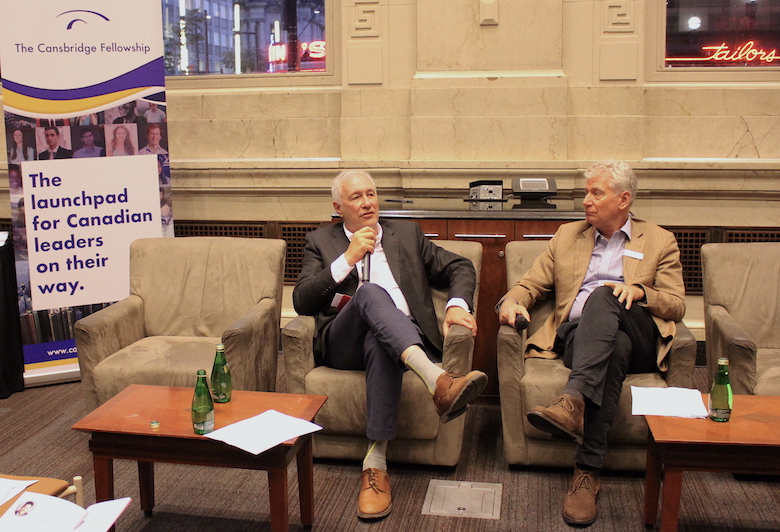
Next Canada CEO Sheldon Levy (left) and APF Canada President & CEO Stewart Beck (right).
Stewart Beck then moderated a fireside chat featuring three prominent speakers: Paul Lee, Managing Partner of Vanedge Capital, Ivy Zhang, CEO of Noah Canada, and Shelley Zhuang, Founder and Managing Partner of 11.2 Capital. The speakers addressed the importance of a global mindset when they look to hire new employees, and Asia (especially China) becoming a powerhouse for R&D.
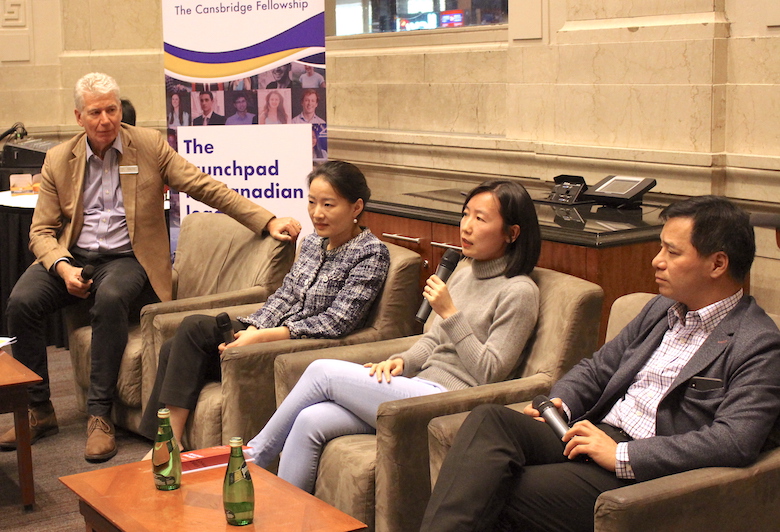
Fireside chat panellists CEO of Noah Canada, Ivy Zhang (centre-left), and Founder and Managing Partner of 11.2 Capital, Shelley Zhuang (centre-right), flanked by APF Canada President and CEO Stewart Beck (far left) and Vanedge Capital's Paul Lee (far right).
Day 2 Recap: Putting Asia Knowledge into Action
Student delegates started the day with an information session by Next Canada on innovation and entrepreneurship, as well as an introduction to how to apply for the Next 36 program. They then moved on to the case competition. Delegates were assigned to a team of three-to-four people to work on one of three cases: 1) a genetic testing and digital health company active in Hong Kong and Southeast Asia (Case #1); a global growth and innovation group within a large global brewing company (Case #2); and, a global provider of cryptocurrency and blockchain projects (Case #3). Each case challenged the students’ ability to critically analyze and synthesize information. For example, Siddhant Talwar, a second-year student at the Rotman School of Management at the University of Toronto, said that even though he had some knowledge of Asia, the case competition motivated him to gain better insights into Asia's vast economy. For example, some populations in Asia are younger than in other countries. That creates opportunities for companies that are trying to capitalize on youth trends in that region.
At the end of the day, each team gave a five-minute pitch, and the winning team from each case received a total cash award of C$1,000.
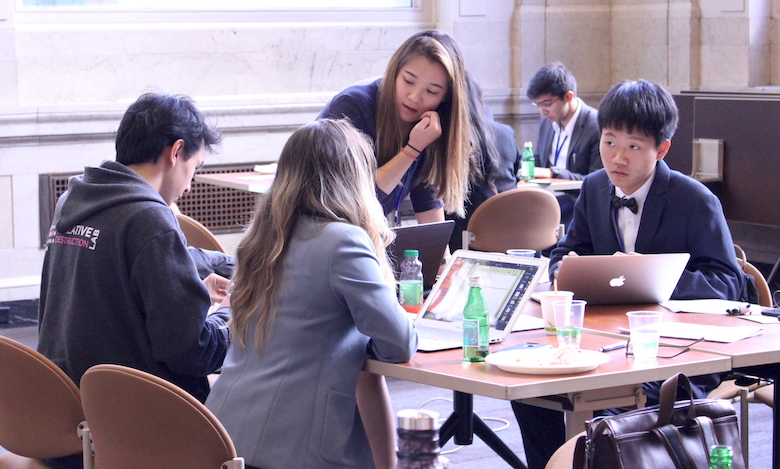
Case #1 team members working hard at developing their five-minute pitch.
At the final case competition presentations, groups of three-to-five participants gave a five-minute pitch based on their case, followed by comments and questions from a panel of experienced judges, which included Joseph Ford, Senior Director of Operations, Indochino; Agata Osinska, VP Product, Axiom Zen; Gerri Sinclair, Managing Director (Vancouver Office), Kensington Capital Partners; and, Shelley Zhuang, Founder & Managing Partner, 11.2 Capital
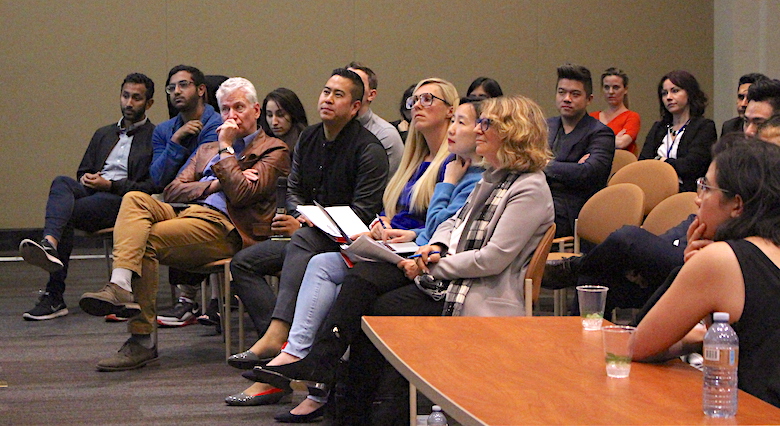
Case competition final judges (from centre, fourth from left) Joseph Ford, Agata Osinska, Shelley Zhuang, and Gerri Sinclair.
The three winning case competition teams were:
Case #1:
Raghav Aggarwal, a fourth-year student in interdisciplinary studies (with a focus in economics and urbanization) at UBC commented on the massive market sizes in Asia, referring to the “Asian scalability paradox,” noting that the size of these markets alone do not automatically result in the scalability of any product or service. Moreover, he added, understanding regional cultural nuances is one way to approach this paradox. It's important to appreciate differences within Asia rather than to treat the region's markets as a whole.
Arslan Azeem, a second-year student at the University of Regina intending to major in philosophy, politics, and economics. Arslan said he wondered whether “we can analyze the cultural differences in Asia, and apply aspects to the business world in Canada. For example, are there customer service strategies in Hong Kong that could be adopted in Calgary?” He also commented that one of the speakers mentioned that Asia (specifically, China) is becoming the world’s next R&D powerhouse. “I am curious,” he said, “to see how this opens up research and educational opportunities between both regions.”
Kristy DeClark, a fifth-year commerce student with a specialization in marketing at the UBC Sauder School of Business, said that after participating in the case competition, she “really felt the impact of the difference in cultural beliefs between Canada and Hong Kong, and going forward I think it is important to continue to consider the consumer at the heart of go-to-market strategies in Asian countries in order to successfully cater to the markets.”
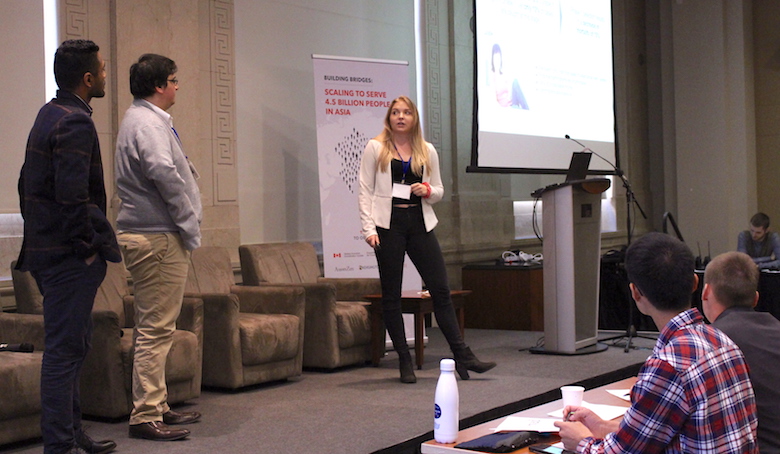
Case #1 winners (from left) Raghav Aggarwal, Arslan Azeem, and Kristy DeClark
Case #2:
Kassymkhan Bekbolatov, a third-year student at SFU majoring in computer science, who said the important lesson he learned from the conference is that “Asia is a huge market that requires deep understanding of how things work. The best way to achieve it is to have a reliable partner who can introduce and help you operate in that market.”
Sagardeep Sandhar, a third-year student in the Bachelor of Business Admninistration program at SFU's Beedie School of Business. Sagar, whose studies are focused on Management Information Systems, said that he gained valuable insights into "the expansion and development of Asian markets and how they are becoming more and more prominent." He added that being able to successfully tap into these markets requires strong communication, and a solid grasp of norms and values in Asian societies.
Isabella Yuan, a fourth-year student specializing in business technology management at UBC, said that her experience of having lived in China “definitely helped [her] gain some insights into what a real Chinese market looks like. Paying attention to the new trends in the market definitely helps a brand find unique ways of promoting its products.”
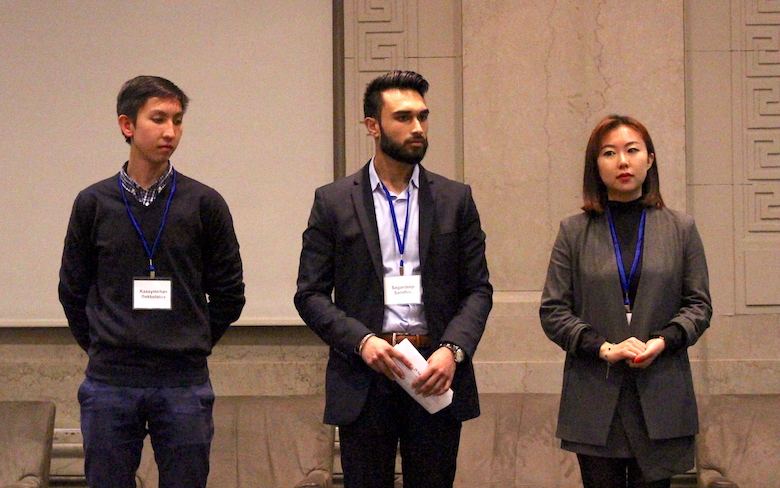
Case #2 winners Kasshmkhan Bekbolatov, Sagardeep Sandhar, and Isabella Yuan
Case #3:
George Cui, a student at SFU majoring in computing science and business administration. George noted that while ambiguity can amplify the cost of doing business in Asia, it also presents a vital opportunity for Canadian leaders who understand Asian cultures, and thus how to navigate that ambiguity “to offer true value to their Asian counterparts in a market where strong relationships are paramount to success.”
Katarina Kosmajac, a fifth-year student at SFU majoring in business (human resources and international business) and with a minor in international studies (international development, economics, and environmental issues). Katarina said: “While studying International Business, I found that it is important for companies to stay current with market trends when planning to expand their operations elsewhere, as it can affect their position in the competitive market.” Continued Katrina: “With my team we estimated the standard fees and/or percentages within the cryptocurrency market. Therefore, we were able to customize to accommodate such trends in Asia and create a well-suited strategy for the SME.”
Derick Or, a fourth-year student at the University of Calgary with a combined degree in accounting and computer science. He noted that “after participating in the Building Bridges case competition, I learned that there are many different strategies that companies can utilize to resolve their current problems. Companies (that) strive to realize growth potential in Asia’s market must constantly think about the global impact while selling locally.” He added that Canadian businesses (that) are considering expanding globally must not make a business decision to do business in Asia based solely on the fact that Asia has many high-growth markets, “as it is imperative to understand the cultural and economic differences in [those] markets.”
Sam Wong, a fifth-year finance major (minor in entrepreneurship) at UBC’s Sauder School of Business. Sam said a key takeaway for him “was how strong relationships are essential to driving economic value for firms in Asia. Practically, I managed to apply this insight in the cryptocurrency case by suggesting a strategic partnership for the client.
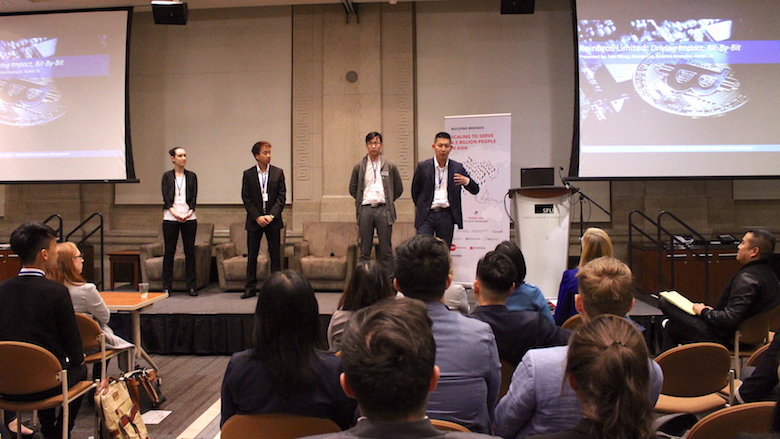
Case #3 winners (from left) Katarina Kosmajac, Derick Or, George Cui, and Sam Wong
APF Canada and the Cansbridge Fellowship congratulate all three winning case competition teams, and sincerely thank the judges and all of the attendees of the event. In particular, we are grateful to the event’s sponsors:
Western Economic Diversification Canada, AxiomZen, Kensington Capital Partners, Next Canada, Noah Wealth Management Ltd., Vanedge Capital Partners, Indochino (In-kind), and (In-kind) the Jack Austin Centre for Asia Pacific Business Studies at Simon Fraser University (SFU).
